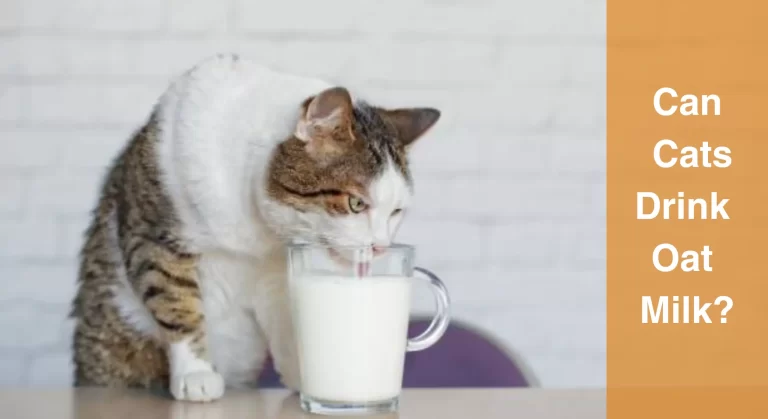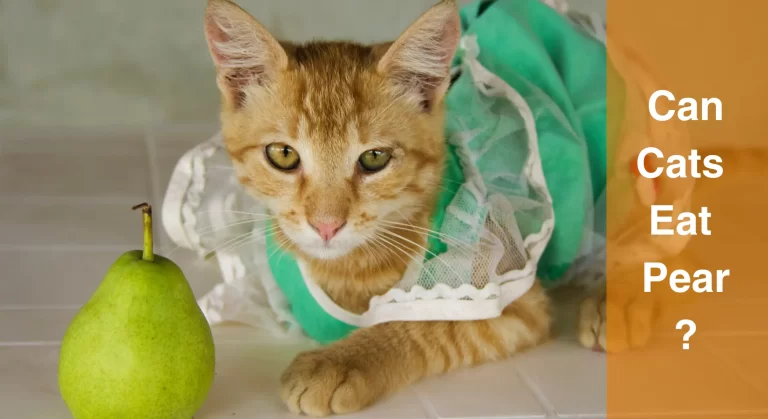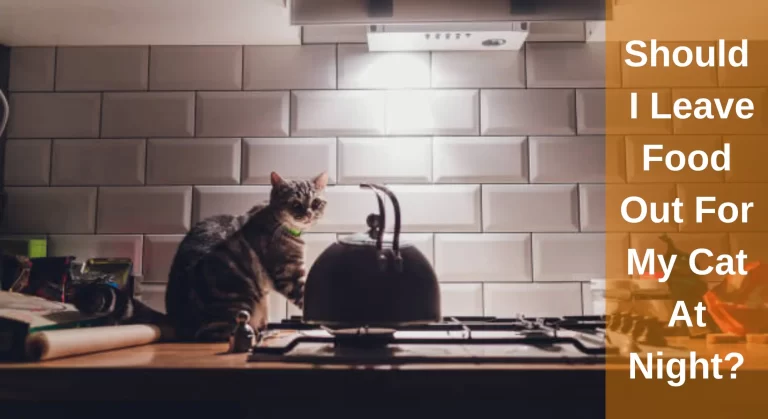Can Cats Eat Cooked Chicken Bones? Cooked Vs. Raw [Explained]
As a cat owner, you might have come across several myths and misconceptions related to feeding cats. One of the most common concerns is about feeding chicken bones to cats. While raw chicken bones are considered safe for cats, many cat owners wonder if cooked chicken bones are safe or not. Can Cats Eat Cooked Chicken Bones?
The quick answer is no—cats shouldn’t eat bones from fried chicken! Cooked chicken bones are very brittle and not at all flexible, so they can break into tiny, sharp pieces that might hurt your cat or cause them to choke and harm to its digestive system. These traits show that these bones are unhealthy for them; thus, your cat should stay away from them.
In this article, we will discuss everything you need to know about feeding cooked chicken bones to your feline friend and provide alternatives for keeping them healthy and satisfied.
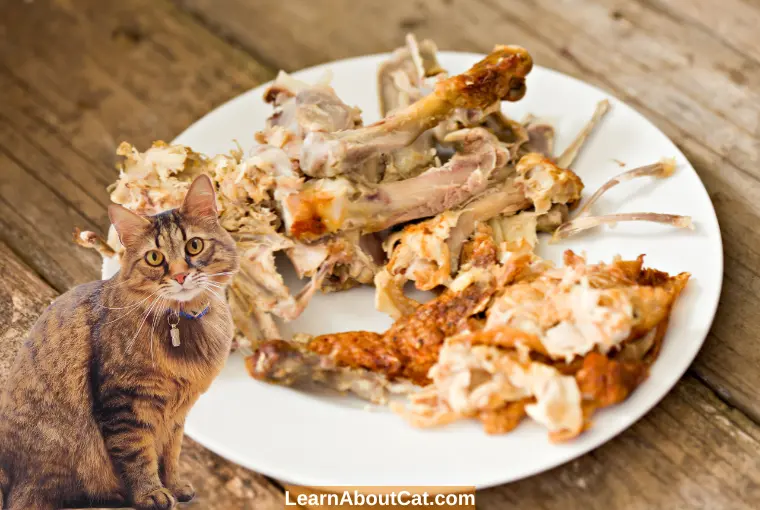
Can Cats Eat Chicken Bones?
While cats are natural carnivores and may enjoy chewing on bones, it’s generally not recommended to feed them chicken bones. It’s important to know the risks and take appropriate precautions before giving them to your cat.
Many veterinarians caution against feeding raw bones to cats and recommend sticking to a high-quality, balanced commercial cat food that meets all of your cat’s nutritional needs instead.
Check Out: Can Cats Eat Pork?
Reasons Why Cats Shouldn’t Eat Cooked Chicken Bones
Cats are carnivores and naturally love to chew on bones. However, it is important to understand that not all bones are safe for cats to consume. Although some doctors may have conflicting ideas about providing cats with raw chicken bones, almost all animal experts agree that giving cooked bones to cats is a big no-no. Cooked bones, in particular, can pose a significant danger to cats including:
1. Damage to the Digestive Tract
Cooked bones are also less likely to break or bend than raw bones. This implies that if your cat consumes a significant portion, it can become impaled in its digestive tract.
If they get stuck in your cat’s mouth, they could be compelled to keep their jaw open, which would be highly unpleasant to them. In the worst-case scenario, they might get lodged in your cat’s throat and cause choking, asphyxia, or even death.
Blockages in the intestines or farther down their digestive system may result in excruciating stomach aches and hinder their regular urination.
2. Bone Fragments and Choking Hazards
Although the majority of people think cats can consume cooked bones without any problems, this is wrong. When your cat starts to eat these bones, they will break into little, sharp pieces which can get lodged in their throats or digestive tract, leading to choking hazards. Consider how dangerous those pointy pieces may be!
These bone fragments can damage to the delicate tissues lining the digestive tract, leading to pain, inflammation, and potential infection.
3. The Risks of Splintered Bones
Cooked bones are brittle and prone to splintering, creating sharp fragments that can cause injuries in cats. These sharp bone fragments can puncture the intestinal walls, leading to internal bleeding and infection.
The mouth can readily be cut by sharp particles, which can also easily injure the gums, neck, and spaces between the teeth. In the worst-case scenario, the shards might cause injuries to the oesophagus, stomach, or intestines. You should get medical assistance since the cuts will pain, bleed, and could be life-threatening.
4. Possibly Hazardous Ingredients
To enhance the flavour of chicken meals, people usually add herbs and spices. However, these spices have the potential to poison your pet.
As a result, cat-specific food should be your only choice! The two spices, garlic and onion, that can result in severe poisoning and, in the worst cases, death, should be avoided by cats.
You Might Like to Read: Can Cats Eat Chicken Broth?
What Do I Do If My Cat Eats Cooked Chicken Bones?
As soon as you notice your cat holding the bone in its teeth, make an effort to remove it. Approach cautiously and let go of the bone to prevent startling your pet.
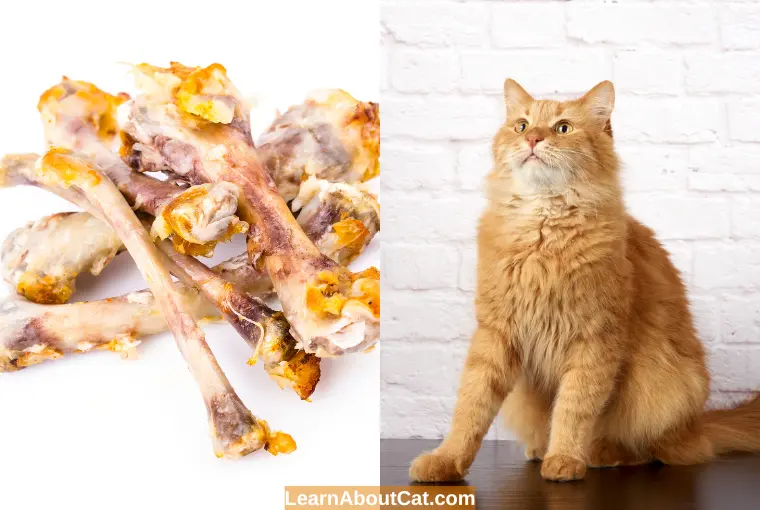
Nevertheless, if you are aware that your cat consumed roasted bones, you must monitor closely for 24-48 hours to ensure there are no odd or concerning symptoms, such as:
- Vomiting
- Diarrhoea
- Fatigue causes a loss of appetite
- Bloating in the belly and broken bones in the stool
- Stomach ache due to spoiled stools
- Gas
As soon as any of these symptoms appear, call the vet. As this is an emergency, do give us a call immediately. If your cat exhibits no symptoms, but the bone hasn’t come out after a few days, there is another cause for concern.
So, contact a vet as soon as possible. The cat probably needs surgery if a wound is leaking or a bone has been lodged.
Your veterinarian may advise further tests if your cat consumed a chicken bone to identify the bone’s position, size, and likelihood of causing issues. This most likely includes having your cat’s abdomen radiographed (tummy).
Your veterinarian could decide that your cat merely needs to be watched, in which case. He might need to be monitored in a hospital if he is exhibiting illness signs, but if he seems healthy, you can usually keep an eye at home. Always pay attention to your veterinarian’s advice, and be alert to any warning signs.
If your vet gives the all-clear, the following basic instructions for monitoring a cat that has eaten a chicken bone at home:
- Feed a bland meal sparingly but consistently (for instance, a canned gastrointestinal diet from your veterinarian). This may encourage your cat to chew on the bone by reducing any harsh edges it may have as it passes through the digestive system.
- To keep them from dehydrating, make sure they have access to plenty of fresh water.
- Make sure your cat is still passing faeces, and check their waste often for any bone fragments.
- If your cat’s veterinarian discovers a rip or obstruction in the digestive tract, your cat will require major surgery to remove the obstruction and, if necessary, heal any damage. After that, he will require a few days of hospitalisation for intensive care, and it may take him a few weeks to fully recover. A cat that has ingested a chicken bone may, in the worst-case scenario, never be able to fully recover.
Interesting Reading: Can Cats Eat Human Food?
Don’t Let Your Cat Eat any more Chicken Bones
To prevent your cat from eating cooked chicken bones in the future ensure that the bones are disposed of in a trash bin that is out of your cat’s reach and in a rubbish bag that is securely fastened.
Keep your cat away from the kitchen or dining area while cooking or eating. Provide your cat with alternative options for chewing, such as cat toys or treats. With these safety precautions in place, you may feel secure against unforeseen medical situations.
Also Read: Can I Feed My Cat Chicken Every Day?
What Happens if a Cat Eat a Chicken Bone?
Your cat shouldn’t have trouble digesting the chicken bone, if lucky. He can get diarrhoea even after digesting the bone because of an upset stomach.
If the bone is not digested entirely, it may cause a blockage, a tear, or both, in his intestines. Call your veterinarian as soon as possible, especially if your cat swallowed a chicken bone and is exhibiting any of the symptoms listed below.
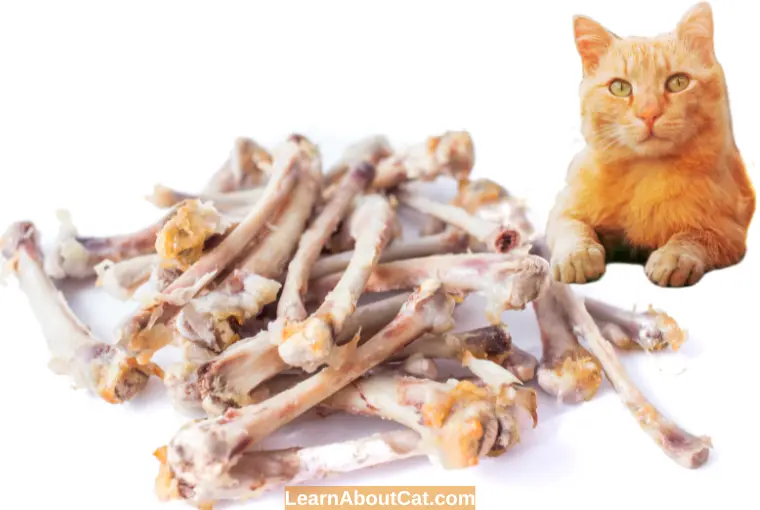
Signs of Bone-Related Issues in Cats
If your cat has ingested a chicken bone, it’s important to watch for signs of bone-related issues, such as:
- Vomiting or regurgitation
- Lethargy or weakness
- Abdominal pain or discomfort
- Loss of appetite
- Diarrhoea
- Blood in the stool or vomit
If your cat exhibits any of these symptoms, seek veterinary attention immediately.
Find Out: Can Cats Eat Goldfish Crackers?
Chicken Bones: Cooked Versus Raw
If fried chicken wings are forbidden, can cats eat raw chicken? Giving cats cooked bones vs raw bones has different health benefits. Suppose you consider how cats originated as an animal that spent a considerable amount of their existence outdoors.

In that case, it makes sense that they would gorge themselves on rodents, birds, and other small prey. Since an outdoor-only cat would kill a mouse and swallow nearly the entire animal, bones and all, a domestic cat is likely to be able to handle a small amount of raw chicken bone in its diet.
If you want to offer raw chicken to your cat, look for little bones like those in wings and necks or those from small birds like quail. While you watch him consume raw bones, pay attention to how he secretes them.
If he exhibits signs of gastrointestinal distress or constipation, cut back on the amount of bone in his diet. Eat no bones if you are experiencing diarrhoea.
Also, Check Out: Can Cats Eat Hot Dogs? 5 Things You Should Know!
Can Cats Eat Raw Chicken Bones?
Cats can eat raw chicken and raw bone. Cats are natural carnivores and it’s a cat’s nature to eat bones, and the capacity of a cat’s stomach to digest them is genetically set.
Uncooked bones are pliable and hard to break. Thus, they don’t offer much risk to your health and are unlikely to cause internal bleeding, blockages, or other issues.
In fact, the majority of specialists concur that they are not only safe for cats but also beneficial to them in several ways.
The Benefits Of Raw Chicken Bones For Felines
You might be uncertain if offering chicken bones to your cat is truly worth it. It turns out that giving your cat raw bones offers a few unique health benefits when fed appropriately.
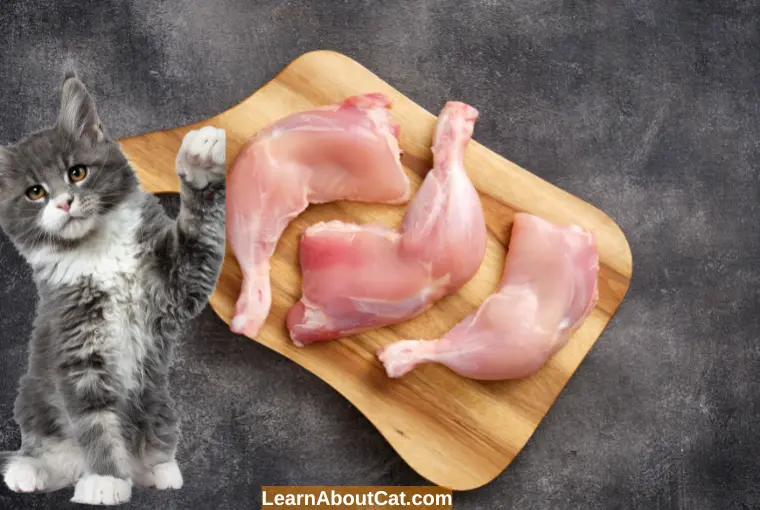
1. Excellent Source of Calcium
Raw chicken bones are a natural source of calcium, which is essential for strong bones, teeth, and muscles. Calcium also increases the bioavailability of other vitamins and minerals, such as zinc, copper, and vitamins A, D, and E.
To put it another way, your cat’s body may use the calcium from raw bones to better absorb other essential nutrients needed for the upkeep of a healthy brain, bones, muscles, and organs.
Calcium also plays a crucial role in nerve function, blood clotting, and enzyme activity.
2. Excellent Source of Additional Nutrients
Raw bones may also include other minerals, including potassium, phosphorus, magnesium, and iron. All of these components are beneficial to your cat’s healthy growth and development, as well as maintaining optimal bodily functions.
If you adhere to the proper guidelines for administering raw bones to cats and have your veterinarian’s approval, you are permitted to add vitamins and minerals to your cat’s diet.
3. Promote Proper Oral and Gum Health
Feeding your cat raw chicken bones may also help keep their teeth and gums healthy. Plaque accumulation can cause bad breath, gum disease, and tooth decay by chewing on bones can help scrape away plaque and tartar buildup, reducing the risk of dental problems such as gingivitis and periodontitis.
Furthermore, chewing has a comparable massage-like effect on your gums, like a toothbrush. With the help of this activity, the teeth and gums can also be reinforced.
The teeth and gums of your pet will be in better condition, which may even result in lower vet bills.
How Do You Give Raw Chicken Bones to a Cat?
Although there are some benefits to providing your cat with raw chicken bones, you must be cautious of how much and how frequently to give them.
Giving cat bones every day is not a smart idea. Furthermore, not all chicken bones are made alike, so you need to be picky and know just what to feed and what not to give. It’s important to do so safely and responsibly to minimize the risk of illness or injury.
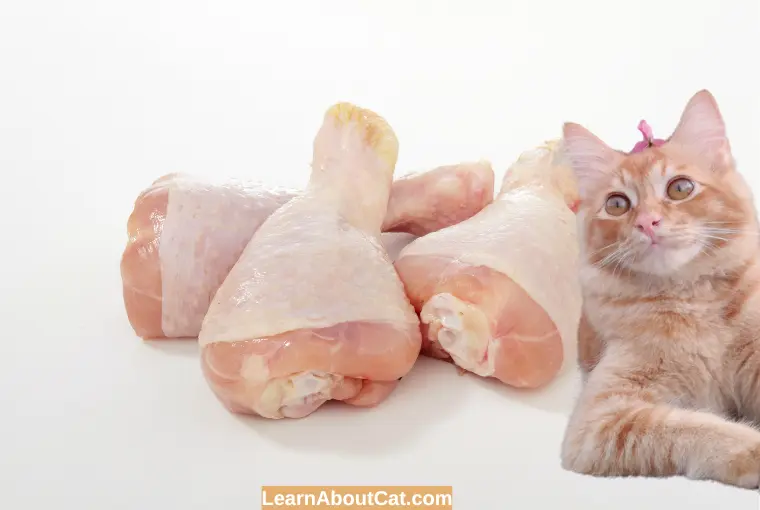
1. Choose the Right Bones
Raw bones should be of a reasonable size—neither too big nor too little. If the cat has a possibility of swallowing the bone, it is too small. Too smallish bones are more likely to become impaled and cause a number of problems, even if they are raw.
Chicken wings, necks or drumsticks are the ideal portion size. Big marrow bones should be avoided since they might damage or shatter the cat’s teeth.
The bones must also be free from preservatives and clean. Over time, preservatives can lead to vitamin deficits and severe problems. Make sure that the chicken is not seasoned or spiced with anything dangerous.
2. Don’t Feed Them Bones Each day
Giving cat bones multiple days in a row may result in constipation since it will take a cat’s digestive system some time to completely digest the bones.
To avoid offering your cat raw bones twice in a row, stretch out the meals over a few days. Just once or twice a week, giving cats bones is plenty.
Consider feeding your cat a balanced diet that includes bone-in meals. This can help provide essential nutrients such as calcium and phosphorus.
3. Monitor your Cat as they Eat
You should watch your cat as it is munching on bones, even though it may sound unusual to do so. Making sure it bites and chews on bones to ensure they are not choking or swallowing large pieces.
If you notice any signs of distress, such as coughing, gagging, or difficulty breathing, remove the bone immediately.
The best time to begin teaching your cat how to eat bones properly is when it is still a kitten. They will learn how to securely chew on bones if you start them out young.
4. Talk to Your Vet
If you are new to feeding your cat raw bones, consider consulting with a veterinarian who can provide guidance and recommendations based on your cat’s individual needs and health history.
Your cat should only eat things that a veterinarian has recommended. This is crucial if your cat suffers from any particular medical issues.
Advice Before Feeding Your Cat Raw Chicken Bones
Even if you decide to give your cat raw bones, you still need to be cautious while giving your pet this present. You may follow these simple procedures to make sure that her bone-chewing sessions go smoothly:
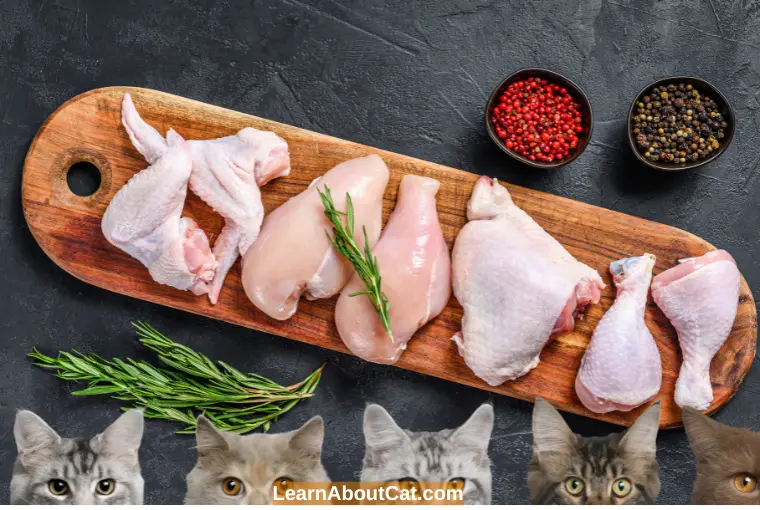
- Consult your veterinarian before deciding to start feeding your pet raw bones.
- Stick to smaller bones like the rib, neck, or wing.
- When giving your pet a bone, always keep an eye on her.
- Birds, especially chickens, turkeys, ducks, and Cornish hens, are the best sources of bones.
- Start giving your cat raw bones when she is still a young kitten, if at all possible. If she does this, she will have more time to learn how to chew bones firmly.
- Last but not least, consider including homemade bone broth in your cat’s normal diet if you’re still not sold on the idea of giving her raw bones or bone meal.
- Homemade broths are free of chemicals, preservatives, and other additives and are rich in vitamins, minerals, and other nutrients. Remember that you shouldn’t use onions or garlic when preparing your broth since they might harm cats.
- Additionally, bone broths are tasty and beneficial to human health, so make sure to save some for yourself as well.
Frequently Asked Questions
Can cats eat any type of bones?
No, cats can only eat certain types of bones that are safe for them, such as raw chicken bones. Stick to bone-in products designed for cats or high-quality, grain-free cat food.
Are commercial bone meal supplements safe for cats?
It is crucial to consult with a veterinarian before adding any new supplement to your cat’s diet, including bone meal supplements.
Can feeding my cat cooked chicken bones cause tooth damage?
Yes, the hardness of cooked chicken bones can cause dental problems, such as fractures, chips, or other dental issues.
Are there any risks to feeding raw chicken bones to cats?
Feeding your cat raw chicken bones can provide some nutritional benefits, but it carries a risk of bacterial contamination such as Salmonella and E. coli, which can cause severe illness.
Always practice good hygiene when handling raw meat and ensure that any bones you feed your cat are fresh and free from any potential contaminants.
It’s important to supervise your cat when they are chewing on bones to minimize the risk of choking or other injuries.
How often should I feed my cat chicken bones?
Feeding your cat chicken bones should be done in moderation, as a treat or supplement to their regular diet. It’s generally recommended to limit bone intake to once or twice a week.
Can chicken bones cause constipation in cats?
If a cat eats a large amount of chicken bones, it may cause constipation due to the hard nature of the bones. However, feeding small amounts of raw chicken bones can actually help regulate a cat’s bowel movements.
Can kittens eat chicken bones?
Kittens should not be fed chicken bones or any other type of bones until they are at least six months old and their digestive system is fully developed. Even then, it’s important to start with small, soft bones and supervise them closely while they are eating.
Final Words!
While cats love meat, feeding them cooked chicken bones can be extremely dangerous. They break apart into tiny pieces because they are fragile and stiff. This might result in a number of health problems, many of which are highly likely to progress into diseases that need urgent medical treatment. If you suspect that your cat has swallowed a bone, seek veterinary attention immediately.
But raw chicken bones are far safer than cooked ones. In addition to providing calcium, potassium, magnesium, iron, and vitamins can also aid in your cat’s dental hygiene. It’s important to feed raw bones in moderation and choose the appropriate size and type of bone for your cat. Remember to always prioritize your cat’s health and safety when feeding them any type of food or treat.
Who is Isabella?
My name is Isabella, and I am a dedicated and knowledgeable cat enthusiast. With years of experience caring for cats and a deep love for felines, I made a mission to help other cat lovers navigate the challenges of cat ownership.


